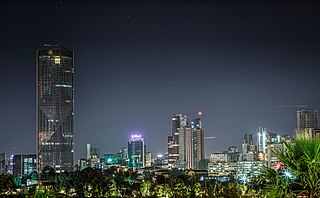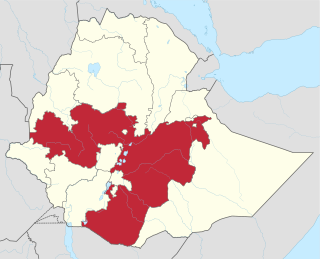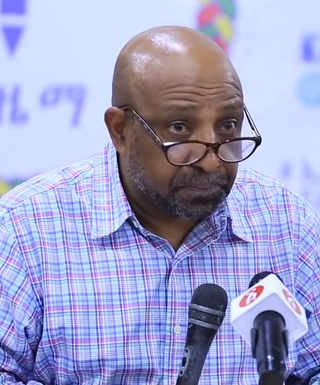
Addis Ababa is the capital and largest city of Ethiopia. In the 2007 census, the city's population was estimated to be 2,739,551 inhabitants. Addis Ababa is a highly developed and important cultural, artistic, financial and administrative center of Ethiopia. It is widely known as one of Africa's major capitals.

Degaga "Mamo" Wolde was an Ethiopian long distance runner who competed in track, cross-country, and road running events. He was the winner of the marathon at the 1968 Summer Olympics.

Lij Iyasu was the designated Emperor of Ethiopia from 1913 to 1916. His baptismal name was Kifle Yaqob. Ethiopian emperors traditionally chose their regnal name on the day they were crowned, and since he was never crowned, he is usually referred to as Lij Iyasu, "Lij" meaning child, especially one born of royal blood.

Oromia is a regional state in Ethiopia and the homeland of the Oromo people. Under Article 49 of Ethiopian Constitution, the capital of Oromia is Addis Ababa, also called Finfinne. The provision of the article maintains special interest of Oromia by utilizing social services and natural resources of Addis Ababa.

Shambel Abebe Bikila was an Ethiopian marathon runner who was a back-to-back Olympic marathon champion. He was the first Ethiopian Olympic gold medalist, winning his first gold medal at the 1960 Summer Olympics in Rome while running barefoot. At the 1964 Tokyo Olympics, he won his second gold medal, making him the first athlete to successfully defend an Olympic marathon title. In both victories, he ran in world record time.

Shewa, formerly romanized as Shua, Shoa, Showa, Shuwa, is a historical region of Ethiopia which was formerly an autonomous kingdom within the Ethiopian Empire. The modern Ethiopian capital Addis Ababa is located at its center.

Tilahun Gessesse was an Ethiopian singer regarded as one of the most popular Ethiopian artist of the 20th century. Noted by his tenor voice, he was nicknamed "The Voice" during his country's "Golden Age" in the 1960s. Tilahun was an eminent singer whose works are attributed legacy to Ethiopian music. Besides his popularity, he raised money for aid during the famines of the 1970s and 1980s and earned the affection of the nation, being awarded a doctorate degree by the Addis Ababa University and also winning a lifetime achievement award from the Ethiopian Fine Art and Mass Media Prize Trust.

Berhanu Nega is an Ethiopian politician who is serving as the current Minister of Education since 2021. He previously was the mayor elect of Addis Ababa, Ethiopia, in the 2005 Ethiopian general elections. He is a founding chairman of the Rainbow Ethiopia: Movement for Democracy and Social Justice and a Deputy Chairman of Coalition for Unity and Democracy (CUD), for whom he served as chief election campaign strategist. He is also the co-founder and leader of Ginbot 7, an anti-government rebel group. Until mid-2018, he was labelled a terrorist by the Ethiopian government.

Ethiopian Coffee Sport Club, otherwise known as Ethiopian Bunna, is a professional Ethiopian football club based in Addis Ababa.
Elizabeth Laird is a British writer of children's fiction and travel. She is also known for the large body of folktales which she collected from the regions of Ethiopia. Her books have been translated into at least twenty languages.
Fire Brats is a series of children's books about two teenagers, Matt and Dani, who both survive post apocalyptic World War III. The books were written by Barbara Siegel, Scott Siegel and Barbara Steiner. The first book, The Burning Land, was published in 1987.

The March of the Iron Will was an Italian offensive occurring from 26 April to 5 May 1936, during the final days of the Second Italo-Ethiopian War. Its goal was to capture the Ethiopian capital, Addis Ababa, in a show of force for Fascist propaganda. An Italian mechanized column under the command of Pietro Badoglio, Marshal of Italy, advanced from the town of Dessie to take Addis Ababa. The march covered a distance of approximately 200 miles (320 km).

Le'ul RasMengesha Seyoum is a member of the imperial family of the Ethiopian Empire. In 1974, the monarchy was abolished by the Derg, a communist military junta.
Hailu Tekle Haymanot, also named Hailu II of Gojjam, was an army commander and a member of the nobility of the Ethiopian Empire. He represented a provincial ruling elite who were often at odds with the Ethiopian central government. Hailu Tekle Haymanot was an independent-minded potentate who, throughout his life, was mistrustful of and mistrusted by the Emperor.

Theodros Teshome Kebede is an Ethiopian filmmaker. Theodros is known for initiating the revival of the Ethiopian film industry in the early 2000s, and for helping to create a boom in film-making in the country. Theodros produces, directs, writes and often acts in his own films, and he has produced films that deal with social issues such as HIV, immigration, and violence against women as well as films with nationalistic content.
The following is a historical events of Addis Ababa, the capital of Ethiopia, including its formation prior to 20th century by chronology.

The presidential election held on 7 October 2013, was the fourth presidential election of the Federal Democratic Republic of Ethiopia to elect the country's third president. Mulatu Teshome was elected by the parliament to a six-year term. Incumbent president Girma Wolde-Giorgis was barred from seeking re-election due to term limits.
The Mecha and Tulema Self-Help Association was an Oromo political and freedom social movement in Ethiopia. The movement was primarily based in Bale, but was active in other regions as well. The organization was accused of committing acts of terror by the Ethiopian government, in hopes of suppressing the Oromo National Movement that was developing at the time. The Association was established by Oromo nationalists like Mamo Mezemer, Haile Mariam Gemeda and Alemu Kitessa.
DejazmatchZewde Gebre-Sellassie was an Ethiopian nobleman, historian, and former deputy Prime Minister of Ethiopia. He was born in the village of Galdu, in the subdistrict of Mecca, to the north-west of Addis Ababa where his father was relegated.

During World War I, Ethiopia briefly forged an alliance with the Allied Powers, following Italy's entry into the war in 1915. In June 1916, a dynastic conflict emerged when the uncrowned Emperor, Lij Iyasu, was alleged to have converted to Islam under the influence of the Ottoman Empire, which led him to be charged with apostasy. As a result, then-regent Ras Tafari Mekonnen, later known as Emperor Haile Selassie, orchestrated a coup d'état in September, deposing Lij Iyasu and installing Empress Zewditu on the throne. Throughout the war, Empress Zewditu maintained a stance of neutrality.













